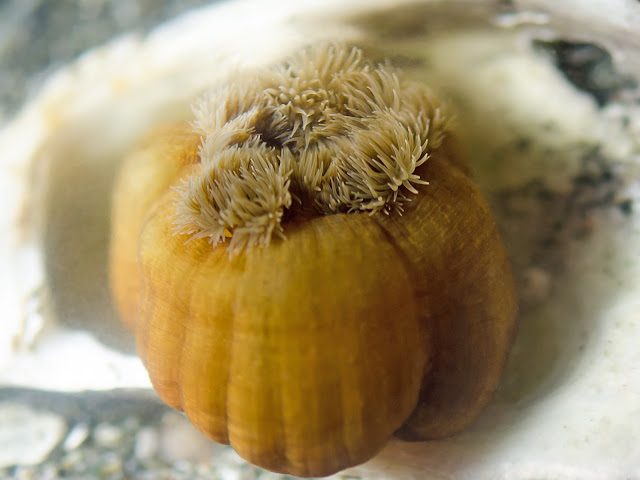My plumose anemone made the mistake of parking on a clamshell on the sand near the low tide mark. And therefore, she* got harvested, and came to live in my tank. Where I try to keep her happy. I keep the water clean and cold, the pump and the bubbler running, the salinity level constant. I feed her shrimp pellets, which she seems to like.
 |
| Short plumose anemone, Metridium senile, as she was when she moved in. |
She abandoned her clamshell soon after she arrived, and wandered around until she found a sheltered spot under the lip of an abalone shell. She's been there ever since. But shells gradually dissolve in salt water, and this one has been in the tank for some years; it's getting thin. The curved lip has crumbled away until there is a hole in the "roof" big enough for a large hermit to crawl through. It was no good as shelter any more. Last week, "Metty" decided to move.
She walked down and out of the shell, up the wall, and around until she found a nice, dark spot with lots of good current. Right at the top of the wall, under the pump. Not a good choice.
She didn't know that the pump gets removed every week, for cleaning; that the water disappears, that the wall gets scrubbed. So she would have to be encouraged to find a better home.
Anemones have stinging tentacles, which they use to trap their food. But when they are disturbed, they pull them inside and close down. Apparently, they are left with no defenses. Just apparently. An upset anemone instantly expels long, stinging strands, called acontia, from pores all around the body, and from the mouth.
 |
| Metty, shut down, and fighting back. |
I was advised to use a metal knife to push at the foot of the anemone to make her want to move. It worked fine with Val, the burrowing anemone, when I moved her to a new tank, but "Metty" wasn't happy about it. She held on so tightly that I had to push the knife all the way under her, damaging her foot. And then, when, the ultimate indignity, I took her entirely out of the water to transfer her to a new shell, she started spewing out these long acontia.
NOTE apparently, holding the anemone upside-down out of water causes it to extrude its acontia, which then hang down by gravity and can be measured. (From A Snail's Odyssey)
I didn't measure them, but they were noticeably longer than the tentacles. They may be as much as 4 inches long, about the length of a mature anemone. And they're more potent than the tentacles, too; the nematocysts are larger, contain more toxins, longer spears.
The filaments are endowed with highly potent nematocysts, are ciliated, and can crawl about on the anemone’s surface. (ASO)
I moved her, still angrily shooting out more acontia, to a bowl in a dark corner while I cleaned the tank. And then, an hour later, I transferred her, shell and all, back to the clean tank.
 |
| Still sulking, but the acontia are gone, and she's starting to open her mouth. |
 |
| 5 minutes later, she's decided to forgive me. Memories are short, and the pump is running. |
By morning, she'd glued herself to the oyster shell, and was standing tall. I fed her two shrimp pellets tonight, and she accepted them quickly. Life is back to normal.
 |
| "Feed me!" |
 |
| Hiding behind the seaweeds. She's a little over 3 inches tall here, taller than she was six months ago. |
I don't think she'll stay on the oyster shell long. I hope she finds a better home than the last place. Because I don't really want to move her against her will again.
*Why I call her "she": these anemones are protandric hermaphrodites, meaning that they start out as males, then become females in adulthood. I assume "Metty" is an adult, so she's probably female already.

Fascinating story! I understand those creatures a little better now.
ReplyDeleteShe is such a beauty! What a great story. I hope she finds a new home that is more suitable. Keep us posted.
ReplyDeleteThat was really interesting. I never thought about them walking, even slowly. - Margy
ReplyDeleteGlad to see she's doing well! She's taken on more mileage than most anemones her age.
ReplyDeleteLovely post Susannah
ReplyDelete